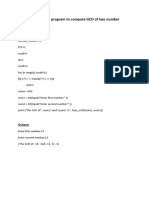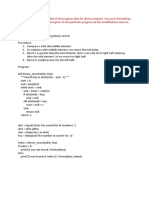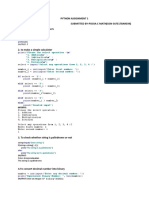0% found this document useful (0 votes)
4 views19 pagesPython Lab 3
The document contains several Python programs demonstrating various list operations, including calculating sums and averages, counting vowels, checking for palindromes, and finding the largest and smallest numbers. It also includes examples of removing duplicates, making shallow and deep copies, sorting names by length, and generating groups of consecutive numbers. Additionally, it covers frequency counting, finding common elements in two lists, and swapping elements.
Uploaded by
onkarshukla843Copyright
© © All Rights Reserved
We take content rights seriously. If you suspect this is your content, claim it here.
Available Formats
Download as PDF, TXT or read online on Scribd
0% found this document useful (0 votes)
4 views19 pagesPython Lab 3
The document contains several Python programs demonstrating various list operations, including calculating sums and averages, counting vowels, checking for palindromes, and finding the largest and smallest numbers. It also includes examples of removing duplicates, making shallow and deep copies, sorting names by length, and generating groups of consecutive numbers. Additionally, it covers frequency counting, finding common elements in two lists, and swapping elements.
Uploaded by
onkarshukla843Copyright
© © All Rights Reserved
We take content rights seriously. If you suspect this is your content, claim it here.
Available Formats
Download as PDF, TXT or read online on Scribd
/ 19























































































